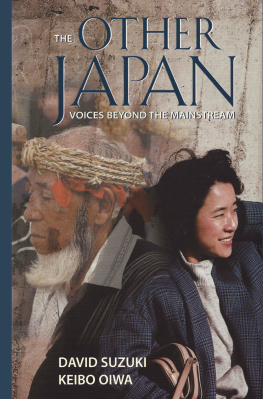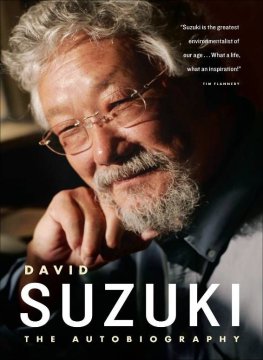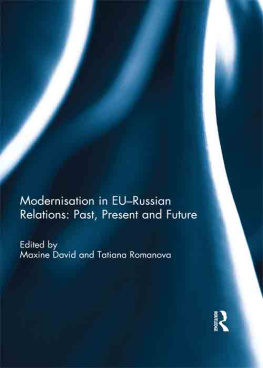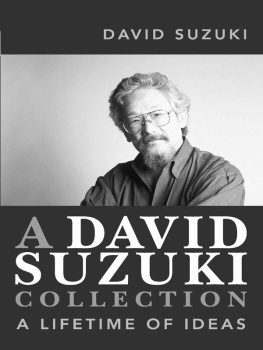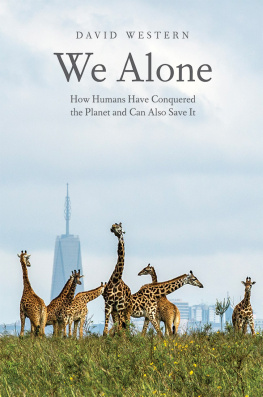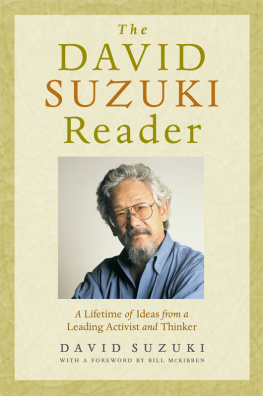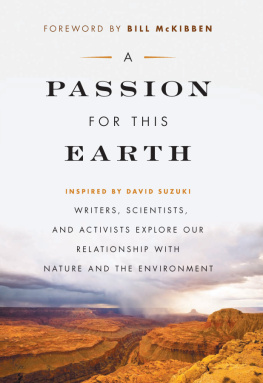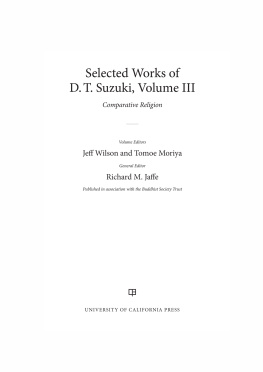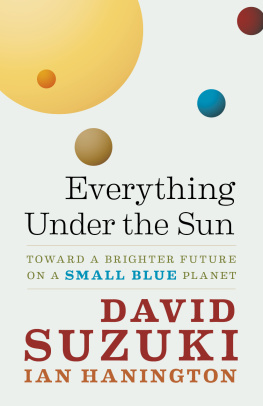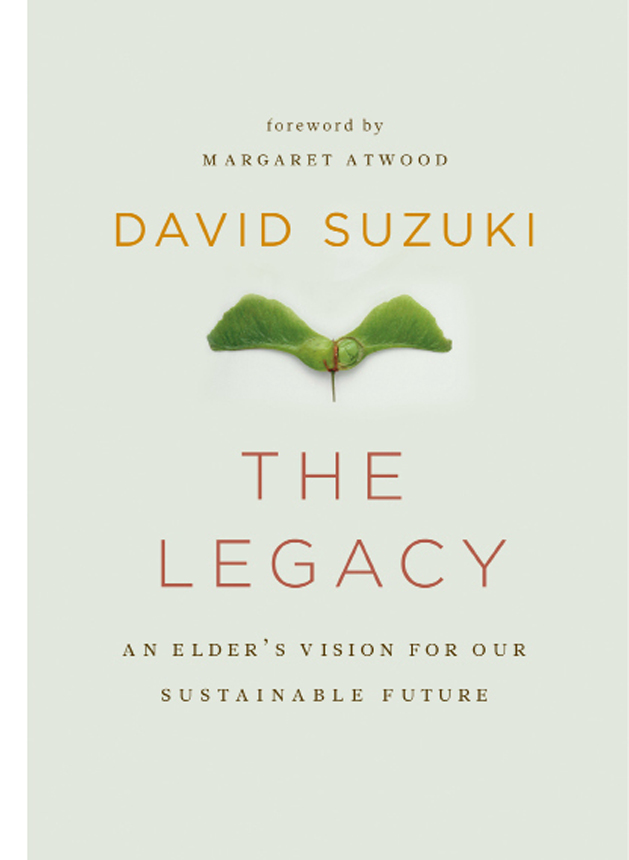
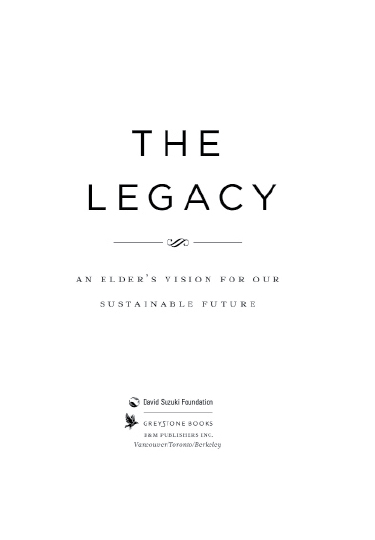

Contents
{ one }
{ two }
{ three }


MARGARET ATWOOD
W HAT YOURE about to read is David Suzukis Legacy Lecture. The term legacy has an ominous ring to it, a hint of departure: surely he isnt going somewhere? Not so soon! Hes a landmark! No other living Canadian has done so muchnationally and internationallyto make us aware of the world we live in and of its precarious state. And no one else started this task so early and has taken so much flak for it.
It seems that David Suzuki has always been with us. Hes lived in the tradition of the great prophetsthose whose messages go unheeded because they tell us things we find uncomfortable. Time after time hes gone up the sacred mountain, listened to the voice, understood that it is what it is, and brought the hard but true words back down, only to find us cavorting around shiny gods of our own devising. Hes been doing that in so many ways, over so many dayson Quirks and Quarks, a radio science program he started; on CBC televisions The Nature of Things, which hes hosted since 1972; and through the David Suzuki Foundation, dedicated to making the world a sustainable place. Its a wonder he never gave up on us. But he didnt: after each potato flung his way, he trudged up the mountain again, rearranged the words to make them more understandable, and gave us another try.
As for his somewhat dire reputationDr. Doom and Gloom, as he himself tells uslets consider the deeper meaning of the word legacy. A legacy is something you pass on, and it assumes there will be someone to pass it on to. Thats quite a leap of faith for Dr. Suzuki, considering the grisly facts hes been facing. But as youll see, he makes the leap. Human intelligence and foresight got us into our present pickle by enabling us to invent such efficient ways of exploiting Nature that our population growth went into overdrive, and now human intelligence and foresight are all we can rely on to see us through the tight bottleneck were fast approachingthat narrowing chasm where far too many people are faced with far too little food and, very possibly, far too little air.
But, says Suzuki, we can do it if we really try, and we really will try if we can visualize the danger were in. Programmed as we are to grasp the low-hanging fruit, enjoy the present hour at the expense of the years to come, and ignore the storm until its almost upon us, we do have the capacity to learn from experience and to look ahead.
David Suzuki is by training a biologista scientistwhich to some people conjures up the image of a white-coated rationalist, devoid of emotion and bent on pure experiment. But no human being is really like that, not even economists. Neurologists tell us that purely rational thinking is an impossibility for us: instead we think-feel; we feel-think. David Suzuki came to biology the way so many have: through the emotions, a love of the natural worldthe world he then set out to explore using his intelligence. What he did with the love and the intelligence is a thing the human race has been doing to its advantage ever since the Pleistocene: he told stories about what he loved and what he discovered, stories that confer a benefit on those who hear them if only they will listen with care.
The legacy in this lecture is one of truthful words about the hard place were in, but its also one of hopeful words: our chanceif we will take itfor opportunity, beauty, wonder, and companionship with the rest of creation. My own hope is that we ourselves will emulate David Suzuki and leave legacies in our turn, and that the planet will through our efforts become a better and more liveable home than the rapidly deteriorating biosphere we find ourselves in right now. Its the nature of gifts to pass from hand to hand; we should thank Dr. Suzuki for the gifts he has given and find within ourselves the grace to pass them on.

N OW THAT Im in my seventies, I know that I am in the last part of my lifeI call it the Death Zoneand that each day is a gift to be celebrated. Impending death is also a powerful motivation to reflect on life and the successes and failures, loves and losses, joys and tragedies, and people, experiences, and events that have shaped who I ammy values and beliefs.
Upon reaching retirement, university professors often deliver a last lecture, in which they pass on the accumulated wisdom of a lifetime. I have already had the temerity to write not one but two autobiographies, one when I reached fifty (Metamorphosis: Stages in a Life) and a second twenty years later (David Suzuki: The Autobiography). But they were recordings of my memories as best as I could recall, pieced together in a chronological sequence, but not deeply reflective.
I have recorded my thoughts and ideas extensively on subjects such as parenthood, academia, science, and politics, but always in bits and pieces in the hundreds of essays Ive written as a journalist and columnist in newspapers, magazines, and journals. I have selected what I considered some of the best in collections such as Inventing the Future, Time to Change, Earth Time, The David Suzuki Reader, and The Big Picture.
But if I were to give a last lecture, what would I say? This book is based on the Legacy Lecture I delivered in December 2009 at the University of British Columbia, where I had been a professor for thirty-nine years. It is my version of a last lecture and an attempt to answer the age-old questions: Whats it all about? What have I learned over a lifetime that Id like to pass on? I also ponder how we as a species have arrived where we are today. We are so dazzled by our own inventiveness that we are blinded to the consequences of technology. We have very suddenly become a major planetary force and have discarded traditional perspectives, believing that whats most recent is the best. Finally, I offer my vision, based on a lifetimes worth of experiences, for a future that is possible, one rich in joy, happiness, and meaning.
Only by confronting the enormity and unsustainability of our impact on the biosphere will we take the search for alternative ways to live as seriously as we must. As an elder, I am impelled by a sense of urgency that comes from the recognition that my generation has induced change and created problems that we bequeath to my children and grandchildren and all generations to come. That is not right, but I believe that it is not too late to take another path.
[ ]
Evolution of a SUPERSPECIES
E VER SINCE our species appeared on Earth, human beings have gathered around a fire to fulfill our most elemental human needcompanionshipas we reaffirm kinship and tribal bonds, recount experiences, share insights, and ponder the great questions that have troubled us for so long:
Who are we?
How did we get here?
Why are we here?
Where are we heading?


